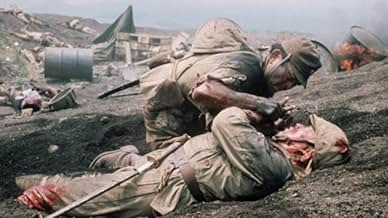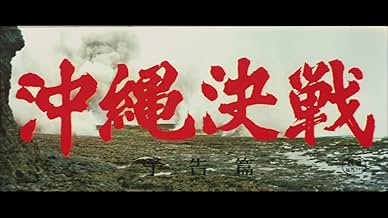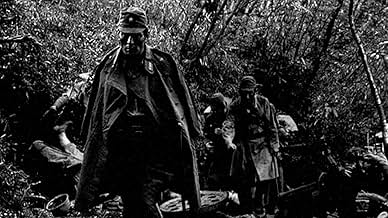IMDb-BEWERTUNG
6,9/10
500
IHRE BEWERTUNG
Füge eine Handlung in deiner Sprache hinzuTold from the Japanese perspective, this war drama captures the events of World War II's Battle of Okinawa - a massive amphibious assault by U.S. troops that left more than 150,000 Japanese ... Alles lesenTold from the Japanese perspective, this war drama captures the events of World War II's Battle of Okinawa - a massive amphibious assault by U.S. troops that left more than 150,000 Japanese civilians dead.Told from the Japanese perspective, this war drama captures the events of World War II's Battle of Okinawa - a massive amphibious assault by U.S. troops that left more than 150,000 Japanese civilians dead.
- Regie
- Drehbuch
- Hauptbesetzung
Empfohlene Bewertungen
I bought this movie for a higher price than i'd care to admit, expecting a interesting take on the Battle of Okinawa with real facts and maybe some cool battle scenes. I was extremely disappointed.
Over the entire movie we are presented with the spiritually pure Japanese angels desperately fighting against those American Yankee murderers that only win the battle because they have unlimited ammo hack Thompson's that they spray and pray without discrimination, as well as some obligatory war crime weapons like chemical bombs. Which as a reviewer before mentioned was not even in use during the Okinawa invasion. I at the same time understand and hate the decision by movie-makers to portray ones own side in a better light than the other. But deliberately making your own side seem so good as it was presented in this movie is borderline historical revisionism. Which is a curse word in my dictionary.
One thing that irked me: Okinawan's were treated like trash by the Japanese during the actual invasion, yet here we are presented with Okinawan civilians that gets denied the great honor of joining the mass suicide of the Japanese soldiers, but eventually after proving their spirit the Japanese soldiers kindly allow them to use one of their grenades to off themselves. I have no doubts that some Okinawan's wanted to willingly kill themselves, but mainly the Okinawan's actually wanted to surrender to the Americans due to how crappy the Japanese treated them, using them as human shields and deliberately forcing them to kill themselves.
Also the combat scenes themselves mainly consists of the Japanese soldiers trying to get stabby stabby while the Americans use 2000 bullets on each of the Japanese in return. There is a lot of gore and blood everywhere, but it comes off as fake and stupid with the bad fighting choreography and the random narrator commenting on how "glorious" the Japanese defenders were.
I suspect the Japanese ultra-nationalists welcome this movie's inaccuracy, but at the same time it also fails as a entertaining movie. The document mixed with the bad acting makes this entire ordeal seem like a lifeless propaganda film that i could easily imagine being created by the actual WW2 Japanese government. That this was actually created 20 years afterwards is astonishing to me.
The history is not actually completely wrong, it is just glaced with lies to make it seem factual. That makes this the worst attempt at propaganda i have ever seen. And i hope that whoever Japanese director that wrote the line "this is the best war movie ever made" which made me buy the movie will be forced to watch Fires on the plain, letters of Iwo Jima or Stalingrad so he can see an actual good war movie and how pointless war actually is.
Man i could go on and on about how bad this movie is To sum it up, this is a stupid jingoistic and historically wrong document movie with many horrible combat scenes.
Over the entire movie we are presented with the spiritually pure Japanese angels desperately fighting against those American Yankee murderers that only win the battle because they have unlimited ammo hack Thompson's that they spray and pray without discrimination, as well as some obligatory war crime weapons like chemical bombs. Which as a reviewer before mentioned was not even in use during the Okinawa invasion. I at the same time understand and hate the decision by movie-makers to portray ones own side in a better light than the other. But deliberately making your own side seem so good as it was presented in this movie is borderline historical revisionism. Which is a curse word in my dictionary.
One thing that irked me: Okinawan's were treated like trash by the Japanese during the actual invasion, yet here we are presented with Okinawan civilians that gets denied the great honor of joining the mass suicide of the Japanese soldiers, but eventually after proving their spirit the Japanese soldiers kindly allow them to use one of their grenades to off themselves. I have no doubts that some Okinawan's wanted to willingly kill themselves, but mainly the Okinawan's actually wanted to surrender to the Americans due to how crappy the Japanese treated them, using them as human shields and deliberately forcing them to kill themselves.
Also the combat scenes themselves mainly consists of the Japanese soldiers trying to get stabby stabby while the Americans use 2000 bullets on each of the Japanese in return. There is a lot of gore and blood everywhere, but it comes off as fake and stupid with the bad fighting choreography and the random narrator commenting on how "glorious" the Japanese defenders were.
I suspect the Japanese ultra-nationalists welcome this movie's inaccuracy, but at the same time it also fails as a entertaining movie. The document mixed with the bad acting makes this entire ordeal seem like a lifeless propaganda film that i could easily imagine being created by the actual WW2 Japanese government. That this was actually created 20 years afterwards is astonishing to me.
The history is not actually completely wrong, it is just glaced with lies to make it seem factual. That makes this the worst attempt at propaganda i have ever seen. And i hope that whoever Japanese director that wrote the line "this is the best war movie ever made" which made me buy the movie will be forced to watch Fires on the plain, letters of Iwo Jima or Stalingrad so he can see an actual good war movie and how pointless war actually is.
Man i could go on and on about how bad this movie is To sum it up, this is a stupid jingoistic and historically wrong document movie with many horrible combat scenes.
Chronicling the bloodiest and most pointless last stand of the Pacific Theatre, The Battle of Okinawa is far more well-known nowadays for essentially giving Hideaki Anno his career. Told in a quasi-documentary-like format, with black and white newsreel footage juxtaposed with narration from Kiyoshi Kobayashi over the dramatic scenes, Kihachi Okamoto manages to expertly balance horrific authenticity with few artistic liberties taken along the way. It's a film that captures an essence of bravery, lunacy and hollow childlike subservience, as well as the sheer devastating horror that gets increasingly desperate and progressively violent the longer it goes on, the final 5-minutes alone comparable to the likes of Saving Private Ryan in its entirety; Okamoto pulls no punches in the graphic details with his cynical, dark sense of humour coming out in full force. With incredible performance from its cast, most notably Tetsuro Tanba and Tatsuya Nakadai, a fantastic if limited score by Masaru Sato and energetic direction, The Battle of Okinawa is an incredible epic, one of exhaustive and continual bombardment that takes no prisoners leaving the camera smeared with blood by its dramatic end.
How do you go about depicting one of the largest and most violent battles of the Pacific Theater of WWII? Is it possible to capture the ugliness and gruesomeness of a battle with 150,000 civilian casualties on celluloid and most important can any depiction by one or the other side be really impartial? The Battle of Okinawa (BOO from now on) succeeds beyond all expectations on the first and better than it has any right to in the second - it doesn't resort to cheap flag-waving but it's not without a sense of patriotism either.
The first hour of the film is devoted to the strategic planning of the battle - Kihachi Okamoto however is smart enough to spice up what in lesser hands could have been boring exposition and setup with a breakneck pace that makes this first hour just whiz by. As is obvious from the title, the protagonist in BOO is the battle - and its victims. It's not a character-driven piece as all the main characters are painted in broad strokes but it's a sprawling war drama that takes us in a bloody tour through every pore, nook and cranny of Okinawa - from the shellshocked trenches and battlegrounds to the primitive hospital set up in a cave lacking all necessities and in itself an image of Dante-ish hell on earth, people screaming and passing out and others having their legs amputated with dull hacksaws and nurses trying to ventilate the place so the injured won't suffocate, to women and children and other civilians hudled together in a cave and gas bombed by American troops to the Army headquarters where officers argue for tactics. Nothing is spared by Okamoto's lens - this is literally the battle of Okinawa in all its morbid glory.
The credentials of the creative team should be the final guarantee that BOO is a movie well worth seeing. Directed by Kihachi Okamoto (SWORD OF DOOM, KIRU, RED LION) and written by Kaneto Shindo (ONIBABA, KURONEKO) and with Tatsuya Nakadai and Tetsuro Tamba spearheading the cast, you really can't go wrong here. It's as bleak and nihilistic as Okamoto's previous chambara output would suggest and not an easy watch for the squeamish - but therein lies the true power of the movie. Even when it resorts to images we might consider trite by now (a little child walking through dozens of corpses in the aftermath of the battle) it's still done with conviction that is true to story and setting.
If we have become jaded by all the images of war and suffering the news networks have only been too eager to churn out and exploit for our curious eyes, war and suffering has lost none of its potency. BOO is not an impartial depiction of the battle - how could it be? It's not a documentary anyway. The patriotism and self-sacrifice of Japanese troops (a form of seppuku in itself) must have made eyes in Tokyo, Hiroshima and Kyoto glisten with tears. Is it not understandable though? Okamoto is not carried away with sentimentality though - this is a slice of war brutality and comes with arms chopped and parents killing their children so they won't fall in enemy hands.
The first hour of the film is devoted to the strategic planning of the battle - Kihachi Okamoto however is smart enough to spice up what in lesser hands could have been boring exposition and setup with a breakneck pace that makes this first hour just whiz by. As is obvious from the title, the protagonist in BOO is the battle - and its victims. It's not a character-driven piece as all the main characters are painted in broad strokes but it's a sprawling war drama that takes us in a bloody tour through every pore, nook and cranny of Okinawa - from the shellshocked trenches and battlegrounds to the primitive hospital set up in a cave lacking all necessities and in itself an image of Dante-ish hell on earth, people screaming and passing out and others having their legs amputated with dull hacksaws and nurses trying to ventilate the place so the injured won't suffocate, to women and children and other civilians hudled together in a cave and gas bombed by American troops to the Army headquarters where officers argue for tactics. Nothing is spared by Okamoto's lens - this is literally the battle of Okinawa in all its morbid glory.
The credentials of the creative team should be the final guarantee that BOO is a movie well worth seeing. Directed by Kihachi Okamoto (SWORD OF DOOM, KIRU, RED LION) and written by Kaneto Shindo (ONIBABA, KURONEKO) and with Tatsuya Nakadai and Tetsuro Tamba spearheading the cast, you really can't go wrong here. It's as bleak and nihilistic as Okamoto's previous chambara output would suggest and not an easy watch for the squeamish - but therein lies the true power of the movie. Even when it resorts to images we might consider trite by now (a little child walking through dozens of corpses in the aftermath of the battle) it's still done with conviction that is true to story and setting.
If we have become jaded by all the images of war and suffering the news networks have only been too eager to churn out and exploit for our curious eyes, war and suffering has lost none of its potency. BOO is not an impartial depiction of the battle - how could it be? It's not a documentary anyway. The patriotism and self-sacrifice of Japanese troops (a form of seppuku in itself) must have made eyes in Tokyo, Hiroshima and Kyoto glisten with tears. Is it not understandable though? Okamoto is not carried away with sentimentality though - this is a slice of war brutality and comes with arms chopped and parents killing their children so they won't fall in enemy hands.
Little known but impressively detailed and completely uncompromising depiction of the battle of Okinawa from the Japanese perspective. I think it deserves a rerelease or more exposure, because as an antiwar film, it's very impressive, and even ahead of its time.
American war films were still a fair way off from showing war in a truly hellish manner at this point in film history- there's a real misery in this one that prevents any battle scenes from being fun or exciting to watch, even if there is a degree of spectacle due to the relatively high budget.
That sense of doom and inevitable loss, coupled with the savage violence that pulls absolutely no punches (it's comparable to Saving Private Ryan, yet came out over 1/4 of a century earlier) makes it a tough but engaging watch, and it mostly earns its lengthy runtime of 2.5 hours.
And of course, a war film like this shouldn't pull punches. It's generally far better to show war on film as ugly rather than exciting, especially a conflict like the one on Okinawa.
Characters are simple but serviceable, and despite the limited character development, you can feel some sympathy for them as individuals stuck in a conflict, whilst still feeling angry at the whole institution of war itself. The way it occasionally checked in on how civilians were coping was particularly powerful and unique, too.
American war films were still a fair way off from showing war in a truly hellish manner at this point in film history- there's a real misery in this one that prevents any battle scenes from being fun or exciting to watch, even if there is a degree of spectacle due to the relatively high budget.
That sense of doom and inevitable loss, coupled with the savage violence that pulls absolutely no punches (it's comparable to Saving Private Ryan, yet came out over 1/4 of a century earlier) makes it a tough but engaging watch, and it mostly earns its lengthy runtime of 2.5 hours.
And of course, a war film like this shouldn't pull punches. It's generally far better to show war on film as ugly rather than exciting, especially a conflict like the one on Okinawa.
Characters are simple but serviceable, and despite the limited character development, you can feel some sympathy for them as individuals stuck in a conflict, whilst still feeling angry at the whole institution of war itself. The way it occasionally checked in on how civilians were coping was particularly powerful and unique, too.
From the director of the terrific "Japan's Longest Day", this is an ambitious documentary-styled recreation of the battle for Okinawa, where hundreds of thousands of soldiers and civilians were abandoned by the Japanese military in order to better protect the mainland. The soldiers fortified themselves in caves and fended of an overwhelming American attack over a period of several months. Unfortunately, the filmmaker's talents don't match their ambitions. "Japan's Longest Day" was a fascinating film written by Shinobu Hashimoto about a little known military revolt at the end of the war. Okinawa is dramatically inept with misplaced bits of humor, and the crowd scenes never number more than 50, making it seem far less epic than it purports to be. The photography is bland and the blood very fake. The desperation never seeps in like it should, but the film does a good job of showing what they went through. It also shows that when the going gets tough, the Japanese commit suicide - according to this film it must have been the leading cause of death. The events depicted are similar to "Sands of Iwo Jima" - so if you like that you might like this. Okinawa is still occupied by American forces. Script by Kaneto Shindo ("Onibaba").
Wusstest du schon
- WissenswertesDirector Hideaki Anno has mentioned that this is the film he has watched the most in his life, well over 100 times.
- VerbindungenReferenced in Caméra d'Afrique (1983)
Top-Auswahl
Melde dich zum Bewerten an und greife auf die Watchlist für personalisierte Empfehlungen zu.
- How long is Battle of Okinawa?Powered by Alexa
Details
- Laufzeit2 Stunden 29 Minuten
- Farbe
- Sound-Mix
- Seitenverhältnis
- 2.40 : 1
Zu dieser Seite beitragen
Bearbeitung vorschlagen oder fehlenden Inhalt hinzufügen

Oberste Lücke
By what name was Kamikaze Okinawa Zero (1971) officially released in India in English?
Antwort































